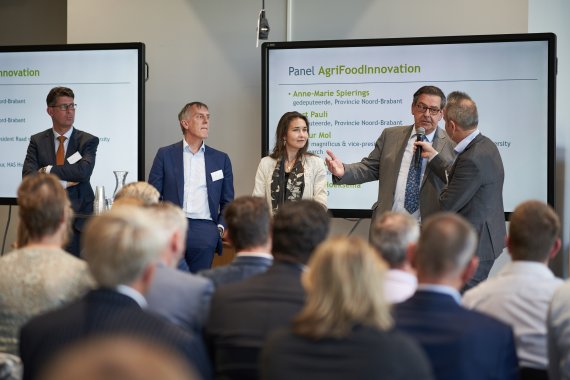Eindhoven University of Technology, WUR, HAS University of Applied Sciences Den Bosch and agricultural organisation ZLTO want Brabant to make the transition to a much more sustainable food production.
‘The time for talk is over; after a year and a half of preparations, we really need to get moving’, warned Wageningen Rector Arthur Mol. He spoke his cautionary words during the panel discussion that concluded the meeting. According to the Wageningen rector, both the developments and investments in this area are making significant progress around the world. ‘We are too slow, especially compared to what is currently happening in China and the US. After a year and a half of talking about setting up this initiative, we really need to get moving. We have to take serious action.’
Partner
WUR has long been looking to collaborate with other universities and found an important partner in the Eindhoven University of Technology a few years ago. Other knowledge institutions, government agencies, interest groups and companies also joined the AgriFood Innovation initiative (webpage in Dutch), which was officially kicked off yesterday during a large meeting.
Moonshots
The starting principle: food production should become more sustainable, the use of raw materials more efficient, less food should be wasted and the sector’s impact on the climate needs to be significantly reduced. Congregating agrifood, high-tech and knowledge of data science should make the sector future-proof. Three “moonshots” were presented yesterday. One focuses on the development of a smart pig chain, the second on the valorisation of vegetable residual flows and the third on digital crop chains.
Having all kinds of crossovers in this sector is amazing, but they still need to earn the investors’ money.
An entire battery of speakers took turns in the spotlight at the Eindhoven University of Technology innovationSpace to emphasise and illustrate the ambitions. Elies Lemkes, lecturer in Sustainable Production at the HAS University of Applied Sciences, spoke of building an entirely new ecosystem, which would also require venture capital. She also emphasised the economic importance: ‘Having all kinds of crossovers in this sector is amazing, but they still need to earn the investors’ money.’
Representatives
Representatives Anne-Marie Spierings (Agricultural Development, D66) and Bert Pauli (Economy & Innovation, VVD) were present for the province of North Brabant, an important investor in this initiative. Pauli said he was happy that this initiative no longer focuses on the products but rather on the design of controlled processes and systems.
We have to learn to speak openly using the same language. There is no time left for us to individually reinvent the wheel.
Ernst van den Ende, Managing Director Plant Sciences group
Speaking for the Eindhoven University of Technology, professor Jakob de Vlieg, who is committed to working with WUR, said that both institutions have a great deal to offer each other, in the field of research as well as in terms of education and talent development. ‘Student teams should be initiated in this area, just like the Eindhoven University of Technology did years ago with the Solar Team Eindhoven.’
Sexy
His counterpart at the WUR, Ernst van den Ende, Managing Director of the Plant Sciences group, found that uniting technology and agriculture increased the latter sector’s “sexiness”. He too agrees that collaboration is vital. ‘We have to learn to speak openly using the same language. There is no time left for us to individually reinvent the wheel.’
(This post was written by Han Konings, general editor of Cursor, Eindhoven University of Technology)

 Arthur Mol (second from the left) speaking with the Brabant representatives Anne-Marie Spierings and Bert Pauli; to his left, Dick Pouwels, President of HAS University of Applied Sciences Den Bosch. Photo: Oscar Vinck
Arthur Mol (second from the left) speaking with the Brabant representatives Anne-Marie Spierings and Bert Pauli; to his left, Dick Pouwels, President of HAS University of Applied Sciences Den Bosch. Photo: Oscar Vinck